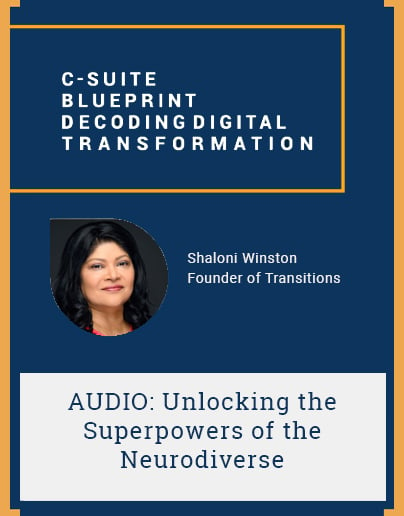C-Suite BluePrint: Decoding Digital Transformation
Superheroes are all the rage today.
Every other movie and TV show in Hollywood has a man or woman with a cape, but there are thousands of real people all around us with untapped superpowers.
Shaloni Winston, CEO of the Lexington, NY chapter of The Arc and Founder of Transitions, told us about the unrealized potential of the neurodiverse workforce.
Shaloni talked with us about:
- Common misconceptions centered around neurodiversity
- How employers can help their workers socially navigate the office
- Giving neurodiverse employees the right tools to succeed
What Is Neurodiversity?
According to the Harvard Medical School, neurodiversity “describes the idea that people experience and interact with the world around them in many different ways; there is no one ‘right’ way of thinking, learning, and behaving, and differences are not viewed as deficits.”
Renowned sociologist Judy Singer first developed the term ‘neurodiverse’ in 1998. As she states in her blog, ‘neurodiverse’ is not a scientific diagnosis but rather a movement that recognizes everyone with neurological differences.
Common examples of neurodiverse men and women would be people on the autistic spectrum or someone with Down syndrome.
Historically, words like ‘handicapped’ or ‘challenged’ have been associated with neurodiverse individuals. In fact, the United States government did not officially retire the obsolete term ‘mental retardation’ until 2013, recognizing the term ‘intellectually disabled’ instead.
A relationship between neurodiversity and dependency is still a prominent narrative today. Yet, Shaloni argues that neurodiverse people are capable of not just independent self-care but succeeding and thriving in our workforce.
Misconceptions Around Neurodiversity
While certain medical conditions may increase the learning curve for the neurodiverse, they aren’t the end-all-be-all to those people’s lives.
As Shaloni pointed out, neurodiverse people don’t have learning disabilities, only learning differences.
In 2008, Shaloni’s daughter was diagnosed with Turner syndrome, a chromosomal disorder unique to women that affects their growth and development. While exploring treatment for her daughter, a neuropsychologist gave Shaloni remarkable insight into the minds of the neurodiverse.
The doctor told her to imagine she was in a foreign country where everyone spoke a different language than her. Even someone with a bright intellect would need time to learn the language. It would be difficult, but she would grasp it with time.
Everyone in the neurodiverse community is capable of being taught. Teachers only need to use the correct language because each person’s learning language is different.
“You start by listening. Just because you have one neurodiverse person, they’re not the same.”— Shaloni Winston
Neurodiverse traits are not a barrier to gaining valuable skills - only an incline. However, when neurodiverse employees take those skills to the workplace, employers can take steps to maximize their workers’ potential.
A Fighting Chance
Many neurodiverse individuals are itching to inject the American workforce with their talents, but the classic office environment can be complex for them. Social navigation in a professional setting is considered the most common frustration for neurodiverse employees.
A few simple accommodations can make a world of difference for someone struggling with the hustle and bustle of the office space:
- The first step business leaders can take to help their neurodiverse employees is simple - listen. By meeting with their employees (not just your neurodiverse ones) to discuss their needs, employers can establish a culture of inclusiveness.
- Clutter can be a massive distraction for the neurodiverse, especially those with obsessive-compulsive personalities. However, maintaining an organized and clean workspace can do wonders for their mental health.
- An open office concept may be inviting to your average worker, but introverts may wrestle with anxiety in a forced social setting. Therefore, leaders should consider allowing these workers to work remotely or in a closed setting.
- Job interviews can be stressful for any prospective employee. If your human resource department is aware of an incoming candidate who is neurodiverse, consider stretching out the interview process over micro sessions to help ease that person into the new environment.
Ultimately, conscientious awareness is the driving force that will give businesses the foresight to help their neurodiverse employees prosper.
Mentoring Through Mindfulness
“For the non-neurodiverse population, we have found that people just want to help, and people want to help others succeed. It gives them passion and a mission.”— Shaloni Winston
Many of us often take the unwritten rules of life for granted, but those norms are usually not absorbed by the neurodiverse through simple observation.
For example, Shaloni shared an instance when her daughter accepted a pizza delivery at their house. However, rather than carry the box horizontally, her daughter held it vertically. It was then that Shaloni realized her daughter didn’t know any better because no one had taught her how to carry a pizza.
That experience is one of the reasons Shaloni believes that a buddy system is one of the most efficient methods of helping the neurodiverse pick up on these unspoken cues.
Our neurodiverse constituents are bright people who don’t need their hands held, Shaloni tells us; they only need to be pointed in the right direction.
A Helping Hand
In a workforce struggling to find employees, people like Shaloni are eager to help businesses guide these talented neurodiverse people on the path to prosperity.
Thousands of these superheroes are chomping at the bit to use their gifts and take accommodating companies to the next level.
They just need a chance.
Craving more? You can find this interview and many more by subscribing to C-Suite Blueprint on Apple Podcasts, on Spotify, or here.
